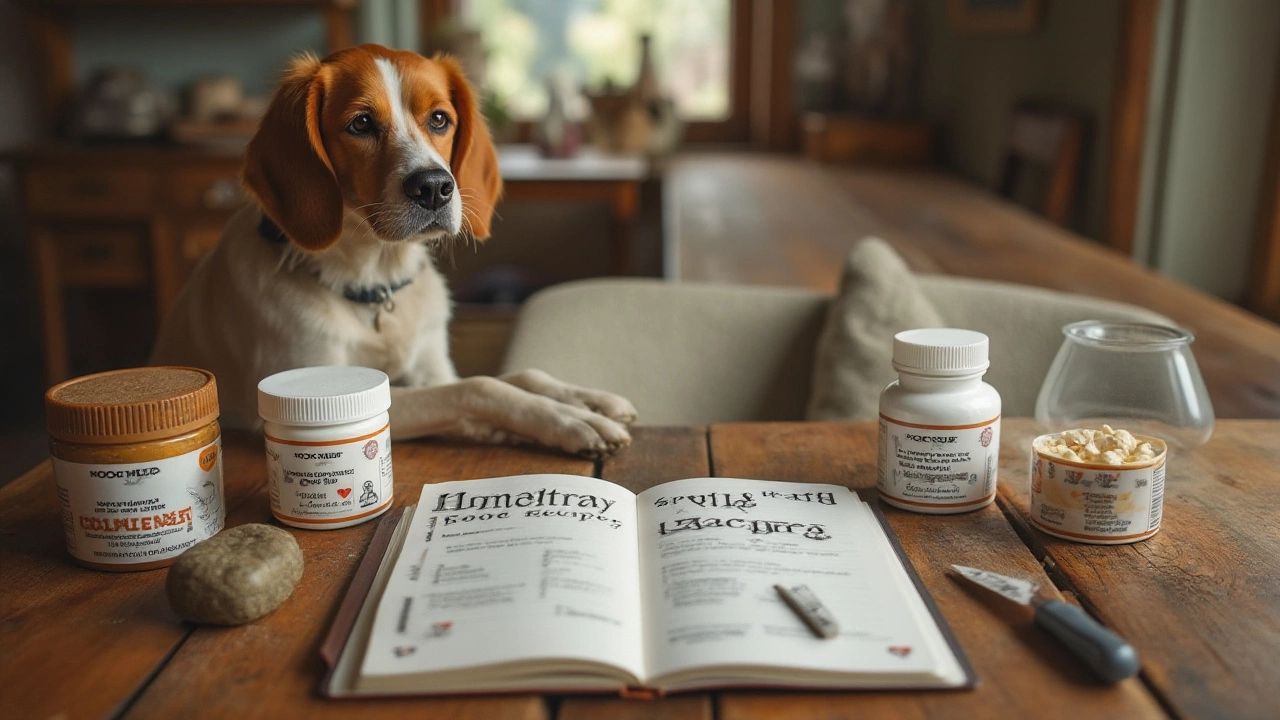Cooking up a storm for our canine companions, especially when it comes to homemade meals, is both exciting and daunting. Those sparkling eyes and wagging tails are often all the persuasion we need to get creative in the kitchen, but are we meeting all their nutritional needs?
When it comes to dogs, not every homemade dish hits the nutritional mark and that's where the role of supplements becomes crucial. Understanding what our furry friends actually need can be a game-changer.
This adventure in canine culinary might require a little math and a lot of love, ensuring Rufus or any dog of yours gets not just a delicious but a balanced diet. Here's a fresh perspective on essential supplements that can complement your homemade efforts, helping you make informed decisions for your dog's diet.
- Understanding Canine Nutritional Needs
- Key Supplements for Homemade Dog Diets
- Dosing and Balancing Nutrients
- Choosing Quality Supplements
- Monitoring Your Dog's Health
Understanding Canine Nutritional Needs
Feeding your dog with love means ensuring every bite they take is packed with the right nutrients. Just like humans, dogs require a blend of proteins, fats, carbohydrates, vitamins, and minerals to thrive. Recognizing what your dog needs is fundamental in preparing a nutritious homemade diet. It's not all about filling their bellies, but nourishing their bodies in the best possible way. Dogs rely heavily on proteins as a primary source of energy. Proteins aren't just for buff muscles; they're essential for a dog's overall health, affecting everything from their fur to their claws. Think of it this way, protein is what makes a dog a dog! This includes building blocks like amino acids that are critical for body function. Animal proteins like chicken, beef, and fish are often touted as the gold standard for dogs due to their complete amino acid profiles.
Then we have fats, not the villain many think they are, especially in a dog's diet. They are rich in essential fatty acids that play a pivotal role in maintaining a dog's skin health and coat shine, not to mention being a concentrated energy source. Carbohydrates often get mixed reviews, but in moderation, they can provide valuable energy too. The trick is choosing the right kinds found in whole grains, vegetables, and legumes, avoiding refined sugars that could lead to trouble down the road. Vitamins and minerals, though required in smaller amounts, are the unsung heroes in your dog's diet. Each nutrient, from calcium for strong bones to zinc for immune function, plays a critical role. A lack or overload can lead to health issues that are sometimes tough to diagnose.
Feeding a homemade dog food means paying attention to these nutrient needs, understanding ratios, and ensuring your dog gets a well-rounded diet. It's interesting to note that, unlike humans, dogs have a higher tolerance for certain imbalances. This doesn't mean they don't need careful consideration; it just highlights how marvelously resilient they are. Something to ponder: in a discussion about canine nutrition, Dr. Sarah Wilson, a famous veterinarian, once said,
'Dogs are like snowflakes, each one needing its own personalized diet even while sharing common requirements.'Imagine a dog like my Rufus, energetic, but with a love for naps; he might need different things compared to a high-flying show dog. Using resources like the Merck Veterinary Manual or consulting with a vet can help guide you in understanding these intricate needs.
Key Supplements for Homemade Dog Diets
When preparing homemade dog food, it's crucial to understand that while your recipes may be filled with love, they might lack certain key nutrients. Commercial dog foods often fortify their formulas with necessary supplements, something you're responsible for when cooking at home. Dogs, like all living beings, require a balanced intake of vitamins, minerals, and other nutrients to thrive, not just survive. So, what exactly can you add to your canine recipes to make them as nutritious as possible? Let's dive into the vital stories behind these key supplements.
First on the list are omega-3 fatty acids, which are powerhouse nutrients found abundantly in fish oil. Omega-3s not only foster a glossy coat and healthy skin, they also aid in brain development and joint health. Their anti-inflammatory properties are particularly beneficial for older dogs or breeds predisposed to arthritis. Including a high-quality fish oil supplement can make a significant difference. It's fascinating how such a small addition can support your pet's immune system and contribute to an overall sense of vitality.
Calcium, another cornerstone of a balanced canine diet, is pivotal for strong bones and teeth. Dogs, particularly growing puppies, need consistent calcium intake for proper skeletal development. If your home-cooked meals consist largely of meat, adding calcium supplements is advised. Look for powdered forms to mix easily with their food. Dairy can be a natural source too, but always ensure your dog is not lactose intolerant. As a substitute, finely ground egg shells are a great, natural way to incorporate calcium.
"Dogs are not carnivores alone; a well-rounded diet is key to their health," asserts Dr. Karen Becker, a holistic veterinarian.
One supplement that often goes unnoticed is probiotics, live bacteria crucial for maintaining a healthy gut. Just like humans, dogs' digestive systems play a vital role in overall health. A probiotic can aid in food digestion and nutrient absorption, ensuring your homemade meals deliver all their potential goodness. Consider starting with a small amount and see how your dog assimilates this setup.
Vitamins are essential, too, and investing in a high-quality multivitamin designed for canine nutrition can be tremendously beneficial. Look for formulations containing vitamins E, A, D, and the complete B-complex. While vegetables in homemade meals can provide some of these, a supplement ensures daily balance. It's critical that supplements compensate for any broad-spectrum shortage homemade diets might inadvertently create.
Finally, trace minerals like zinc, iron, and magnesium should round out a comprehensive canine supplement routine. These are necessary for everything from enzyme functions to oxygen transport and blood health. They are typically found in organ meats or specialized supplements. Remember to consult your veterinarian before starting any regimen, especially if your dog has unique health needs or conditions.
Adding these dog supplements doesn't just improve meals nutritionally. They enhance every wag of the tail, every game of fetch, and every cuddle session. A nutritious meal is a pathway to a happier, healthier life for your pet, making it worth every second spent in the kitchen.

Dosing and Balancing Nutrients
In the world of homemade dog food, getting the dosing and balancing of nutrients right isn't just about following your heart. It takes a bit of science and careful observation. Knowing the right proportions of calcium, vitamins, fatty acids, and other supplements can make all the difference in your dog's health.
Let's break it down: dogs, unlike humans, have specific needs when it comes to nutrients. For instance, calcium is not just a minor player—it's crucial for bone health and proper muscle function. Typically, homemade diets can fall short if you're not mindful of this. Adding calcium should be done carefully, knowing it's about maintaining balance rather than going overboard. A general guideline is about 1000 milligrams per pound of homemade dog food.
Be mindful of omega-3 fatty acids too, essential for a healthy coat and keeping inflammation at bay. Fish oil or flaxseed oil are common choices. It's usually recommended to add about 100 milligrams of DHA and EPA per 10 pounds of body weight daily. Tailoring the dose specific to your dog's size and breed matters, as the needs of a Chihuahua vary greatly from those of a German Shepherd.
Vitamins are another essential category. Vitamins like A, D, and E need careful calculation to ensure your dog's body utilizes them efficiently. It's interesting to note that overloading on these could harm rather than help, given their fat-soluble nature, which leads to potential accumulation in the body.
Let's not overlook the importance of weighing ingredients accurately to ensure consistent daily dosage. A kitchen scale can be your best friend here. It ensures precise measurements, preventing guesswork and promoting a balanced diet, which home cooking is all about.
Consider nutrient interaction as a part of balancing the diet. Some nutrients enhance each other's absorption, like Vitamin D and calcium, forming a perfect kitchen duo. Meanwhile, others compete, like copper and zinc; being aware can prevent unintended deficiencies.
Vet nutritionists often point out, "The art in supplementation lies not just in adding what's missing but in removing what's in excess." Balancing a diet implies making these little tweaks based on observation and periodic health check-ups.
“Dogs don’t require a lot of variety in their diet, but they do need quality and consistency,” says Dr. Sarah Carter, a certified veterinary nutritionist offering insights into balancing homemade diets.
A practical way to ensure your dog's health is matching their supplements with visible changes. If your dog is more energetic and their coat is shinier, chances are, you're doing it right. If something feels off, revisiting the diet plan with your vet would become essential. Keeping a food diary can provide helpful insights, logging meal ingredients and daily health changes.
Choosing Quality Supplements
Choosing the right dog supplements for your homemade dog food recipes can seem like a maze of misinformation and overwhelming options. The variety on pet store shelves or online can make any pet owner hesitant. After all, we all want the best for our four-legged friends, ensuring they thrive on a diet rich in essential nutrients. The first step is understanding what these supplements actually do and why they are important. Supplements like calcium and omega-3 are not luxuries but necessities to make your homemade recipes nutritionally complete. Calcium, for instance, plays a significant role in maintaining robust bones and teeth, which is fundamental given your dog's active lifestyle.
Reading Labels and Misleading Claims
Label reading is more art than science, especially when it comes to canine nutrition. The pretty packaging and bold claims – 'All-natural!' or 'Veterinarian-approved!' – often need to be taken with a grain of, well, vitamins. Be wary of buzzwords that might sound great but say little about the product’s efficacy. The ingredients list should be scrutinized, focusing on the active component's purity and source. Ideally, elements like glucosamine or chondroitin, which aid in joint health, are derived from natural sources for better absorption.
Certification and Industry Standards
Quality can be validated somewhat through industry certifications. Look for products certified by organizations such as the National Animal Supplement Council (NASC), which provide a level of trust. These certifications suggest rigorous testing for safety and potency. An interesting stat from NASC states that products strictly adhering to their standards have shown a 30% improvement in nutrient absorption in dogs over products without certification. Always keep an eye out for these seals when choosing.
Holistic Approach to Supplementation
An optimal, balanced approach would not rely solely on supplements but consider them as supporting actors to a whole food, nutrient-rich diet. Consulting with a veterinary nutritionist is often wise. They can help tailor choices to your dog's specific needs, age, size, and health conditions. Expensive does not always mean better, but carefully chosen supplements can indeed be a worthy investment in your dog's long-term well-being. In the words of Dr. Susan Wynn, a well-regarded vet nutrition expert:
“Supplements should bridge the gaps in a home-prepared diet, not overshadow it.”Recognizing when and why your homemade diet may fall short is as critical as selecting those quality supplements.

Monitoring Your Dog's Health
Staying attentive to your dog's health when introducing dog supplements along with homemade meals is crucial. The addition of supplements like omega-3s or calcium can significantly affect your dog's wellbeing. To ensure you're on the right track, regular monitoring becomes essential. Pay close attention to any changes in behavior, energy levels, coat condition, and overall mood. A dog’s body language speaks volumes, and subtle changes can be early indicators of nutritional success or shortcomings.
Establish a routine to observe and document any physical changes. This might include a bi-weekly assessment of their skin and coat condition, checking for shine and thickness, and their stool quality, which can reveal digestive health. Unexplained weight gain or loss might suggest that nutrient levels need adjusting. Over time, you'll likely learn what is typical for your pet which will help you detect anomalies more quickly. Homemade dog food supplements should enhance health, and any consistent issues suggest a reassessment of diet.
Consult your veterinarian regularly, particularly when you make initial changes to your dog’s diet. They bring expertise and, perhaps just as importantly, an objective eye. Including your vet in the monitoring process ensures a holistic approach. A substantial number of veterinarians, cited in a study published in the Journal of Veterinary Medicine, believe regular health check-ups are pivotal when dietary shifts occur.
"Integrating supplements into homemade diets requires careful, individualized monitoring," notes Dr. Elaine Campbell, a holistic veterinary nutritionist.
If you choose to track changes more precisely, consider nutritional blood testing. This involves testing vitamin and mineral levels, protein status, and more, which can tell you if your pet’s current diet balances their needs. Though not necessary for every pet, it can provide peace of mind for owners particularly tuned into the health impacts of their homemade diets. Whether manually keeping track or using digital health apps designed for pet owners, your diligence will equate to a healthier and happier pet.
Don't overlook the benefits of community and shared experiences. Join forums or local groups where pet owners discuss canine nutrition. Often, real-world experiences offer tips that might complement what veterinary science provides. Knowing what’s been helpful for others could benefit your approach, offering perspectives you hadn't considered. Sharing your journey also helps build a support network, enriching both your knowledge and confidence in the pet care process.





